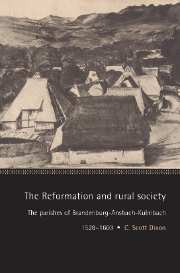Book contents
- Frontmatter
- Contents
- Preface
- Abbreviations
- Introduction
- 1 The emergence and reception of the evangelical movement 1521–1533
- 2 The Lutheran church in Brandenburg-Ansbach-Kulmbach
- 3 The clergyman in context: the extension of the Reformation to the parish
- 4 The Reformation and parish morality
- 5 The acculturation of the parish mind
- Conclusions
- Bibliography
- Index
- CAMBRIDGE STUDIES IN EARLY MODERN HISTORY
1 - The emergence and reception of the evangelical movement 1521–1533
Published online by Cambridge University Press: 03 October 2009
- Frontmatter
- Contents
- Preface
- Abbreviations
- Introduction
- 1 The emergence and reception of the evangelical movement 1521–1533
- 2 The Lutheran church in Brandenburg-Ansbach-Kulmbach
- 3 The clergyman in context: the extension of the Reformation to the parish
- 4 The Reformation and parish morality
- 5 The acculturation of the parish mind
- Conclusions
- Bibliography
- Index
- CAMBRIDGE STUDIES IN EARLY MODERN HISTORY
Summary
THE REFORMATION IN THE TOWNS
In A Dialogue Concerning Heresies Thomas More made two observations that have since become commonplace in modern histories of the Reformation movement. More reasoned that the urban environment first gave the movement scope for development, while the strength of popular support ensured the movement's success:
And yet in dyverse other partyes of Almayne and Swycherlande, thys vngracyous secte [Lutheranism] by the neglygence of the governours in great cytyes, ys so ferforth grown, that fynally the commune people have compelled the rulers to folow them, whom yf they had take hede in tyme, they myght have ruled and led.
Recent scholarship has supported More's observations. The urban environment was very important for the reception and survival of the evangelical faith in the Empire. The teaching of the reformers seems to have found a vast and eager audience among the ‘commune people’. But these two points have to be qualified. The urban environment in sixteenth-century Germany was far from a uniform setting. Cities adopted the Reformation for different reasons to different ends; there was no fixed pattern to the Reformation in the cities, even if the coincidence of interests or the rationale behind reform may have honoured certain similarities from place to place. The same can be said for the role of the common man. The spread of the Reformation in the countryside was often encouraged and facilitated by the peasantry; but, like their urban counterparts, the rural parishioners acted out of complex motives. And yet More's assumption is fundamentally correct:
- Type
- Chapter
- Information
- The Reformation and Rural SocietyThe Parishes of Brandenburg-Ansbach-Kulmbach, 1528–1603, pp. 7 - 46Publisher: Cambridge University PressPrint publication year: 1995



